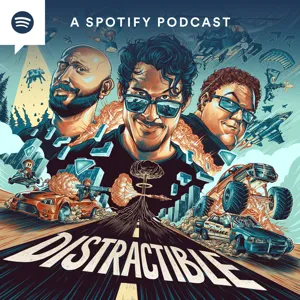Ep 139 Supplements: “This statement has not been evaluated by the FDA”

Explore "health risks" with insightful episodes like "Ep 139 Supplements: “This statement has not been evaluated by the FDA”", "#245 Ozempic. The truth about the side effects and risks of this Magic Pill with Johann Hari", "Are ‘Forever Chemicals’ a Forever Problem?", "What To Know About The New EPA Rule Limiting 'Forever Chemicals' In Tap Water" and "What Alcohol Does to Your Body: Harvard’s Dr. Sarah Wakeman With the Medical Facts You Need to Know" from podcasts like ""This Podcast Will Kill You", "The Doctor's Kitchen Podcast", "The Daily", "Short Wave" and "The Mel Robbins Podcast"" and more!


Johann Hari is back on the podcast today and he looks completely different to the last time I saw him. He’s lost an incredible amount of weight, his face looks completely different and it’s all because of a drug you’ve probably already heard of. Ozempic.
Also known as GLP-1 agonists, these drugs were initially used by doctors like myself in General Practice for type 2 diabetics, but have now found a use case to treat obesity.
For over a year, Johann has been self treating with the drugs and diving into the history of how these drugs were discovered and utilised. From the lab to the pharmaceutical companies & the doctors surgery to the popular pages of celebrity gossip columns; Johann tells the full story without shying away from the potentially dangerous reality of the sideffects and risks of these popular medications.
We talk about:
What Ozepmic and similar drugs do to your brain and gut
How it impacts addiction to food and other substances
What the potential risks are including cancer, pancreatitis and bowel obstruction
Why UPF and obesity are the main concern
You can purchase Johann’s newest book, ‘Magic Pill: The Extraordinary Benefits and Disturbing Risks of the New Weight Loss Drugs’, available on 2nd May 2024, here: https://amzn.to/3Ulz2UB
Johann Hari is a New York Times best-selling author, his books include, ‘Chasing the Scream’, ‘Lost Connections’, and ‘Stolen Focus’. He has written for the world’s leading newspapers and magazines, and has twice been named ‘National Newspaper Journalist of the Year’ by Amnesty International.
🎬 Watch the podcast on YouTube here
📱 Download The Doctor’s Kitchen app for free*
🌐 View full show notes, including guest details, on our website
*The Doctor's Kitchen App gives you access to all of our recipes, with specific suggestions tailored to your health needs and new recipes added every month. We’ve had some amazing feedback so far and we have new features being added all the time - check it out with a 14 day free trial too.
Do check out this week’s “Eat, Listen, Read” newsletter, that you can subscribe to on our website - where I send you a recipe to cook as well as some mindfully curated media to help you have a healthier, happier week.
🥗 Join the newsletter and 7 day meal plan
🐦 Tweet me
We would love to get your feedback on the subject matter of these episodes - please do let me know on our social media pages (Instagram, Facebook & Twitter) what you think, and give us a 5* rating on your podcast player if you enjoyed today’s episode
Hosted on Acast. See acast.com/privacy for more information.

The Environmental Protection Agency has begun for the first time to regulate a class of synthetic chemicals known as “forever chemicals” in America’s drinking water.
Kim Tingley, a contributing writer for The New York Times Magazine, explains how these chemicals, which have been linked to liver disease and other serious health problems, came to be in the water supply — and in many more places.
Guest: Kim Tingley, a contributing writer for The New York Times Magazine.
Background reading:
For more information on today’s episode, visit nytimes.com/thedaily. Transcripts of each episode will be made available by the next workday.


Today you’re getting a masterclass from one of the most renowned and respected experts on alcohol.
She’s here to give you the latest research and science of how alcohol impacts your body, brain, and mind. She’s going to give you facts, dispel myths, and help you be informed about the decisions you are making when it comes to your mental, physical, and emotional health when it comes to alcohol consumption.
Dr. Sarah Wakeman is Senior Medical Director of Substance Use Disorder at Mass General Brigham, home to nationally recognized hospitals and cutting-edge research. She's also an Associate Professor of Medicine at Harvard Medical School and the Program Director of Mass General Substance Use Addiction Services.
How much is TOO much alcohol?
Is some alcohol healthy?
What happens to your brain when you drink?
And how do you help someone you love who drinks too much?
Get the latest research so that you make the most informed decisions about the role alcohol plays in your life.
For lots more resources, click here for the podcast episode page.
Connect with Mel:

There’s an ingredient in Skittles and lots of other food that Dunkin Donuts stopped using it in their powdered donuts. Skittles said they were phasing it out too back in 2016 but still haven’t and now the lawsuits flow like The Spice.
See omnystudio.com/listener for privacy information.


View the Show Notes For This Episode
Get Free Weekly Health Tips from Dr. Hyman
Sign Up for Dr. Hyman’s Weekly Longevity Journal
Get Ad-free Episodes & Dr. Hyman+ Audio Exclusives
In today’s episode, I talk with Ken Cook, Dr. Elizabeth Boham, and Maggie Ward about toxin exposures all around us and how to remove toxins from our bodies.
Ken Cook is the president and co-founder of the Environmental Working Group (EWG). He is widely recognized as one of the environmental community’s most prominent and influential critics of industrial agriculture and the nation’s broken approach to protecting families and children from toxic substances. Under Cook’s leadership, the EWG has pioneered the use of digital technologies to empower American families with easy-to-use, science-driven tools to help reduce their exposure to potentially harmful ingredients in food, drinking water, cosmetics, and other household products. Capitol Hill’s closely read newspaper The Hill regularly lists Cook in its annual roster of Washington’s top lobbyists, writing that Cook’s “influence spans the country” and calling EWG “the tip of the green movement’s spear.”
Dr. Elizabeth Boham is a physician and nutritionist who practices Functional Medicine at The UltraWellness Center in Lenox, MA. Through her practice and lecturing she has helped thousands of people achieve their goals of optimum health and wellness. She witnesses the power of nutrition every day in her practice and is committed to training other physicians to utilize nutrition in healing.
Maggie Ward, MS, RD, LDN, is the Nutrition Director at The UltraWellness Center. Maggie holds a master’s degree in Nutrition from Bastyr University which focuses on using whole foods for holistic Nutrition Therapy. In addition, she completed her requirements to become a registered dietitian at Westchester Medical Center in NY. Prior to joining The UltraWellness Center team in 2008, Maggie worked at The Brooklyn Hospital Center in New York providing nutrition counseling to children and families dealing with HIV. She also taught at the Jewish Community Center in Manhattan and other sites throughout New York City, teaching nutritionally focused cooking classes for children and adults. Much of her focus is on food allergies, digestive disorders, inflammatory conditions, pediatrics, and sports nutrition.
This episode is brought to you by Rupa Health and ButcherBox.
Streamline your lab orders with Rupa Health. Access more than 3,000 specialty lab tests and register for a FREE live demo at RupaHealth.com.
ButcherBox is giving new members FREE ground beef for LIFE with their first order. Visit butcherbox.com/farmacy and use code FARMACY.
Hosted on Acast. See acast.com/privacy for more information.

Why do we all eat stuff that isn’t food and why can’t we stop? In this episode, Dr Chris van Tulleken, author of Ultra-Processed People explains all. As well as being one of the UK’s leading science broadcasters, Chris is a practising infectious diseases doctor in the NHS. He gained his medical degree at Oxford University and his PhD in molecular virology from University College London, where he is an associate professor. He works closely with the World Health Organization and UNICEF, and his research looks at how corporations affect human health.
In this episode, Chris explores what may be the biggest public health crisis of our time: ultra-processed food, or UPF, for short. Many people these days, certainly most regular listeners to this podcast, will be aware of UPFs. But there’s still a lot of confusion around what they really are. For Chris, it’s simple: if it’s wrapped in plastic and has at least one ingredient you wouldn’t find in a home kitchen, it’s a UPF. If it makes a health claim on the packet? Ironically, it’s even more likely!
A UPF is any food that’s processed industrially and created for big-business profit, rather than to provide nutrients. And here in the UK, UPF makes up 60 percent of the average diet. The trouble is, says Chris, UPFs have been shown to be the leading cause of early death in the world, ahead of tobacco. Even if you remain at what is considered a healthy weight, consuming UPFs still leaves you vulnerable to things like Type 2 Diabetes, heart disease, dementia, anxiety, depression, inflammatory bowel disease, cancer and eating disorders.
In this conversation, Chris provides a clear definition of the difference between processing and ultra-processing, and explains how our toxic food environment is designed to be addictive. We also discuss a whole range of different topics such as the need to see obesity as a condition and not an identity and the seemingly revolutionary idea that re-prioritising food shopping and cooking as a vital, enjoyable part of our day, could be a first step towards the societal change that’s urgently needed.
This podcast episode is not about shame or blame - it’s about education and empowerment. Chris is a brilliant communicator who insists the prevalence and appeal of UPFs is not our fault. I thoroughly enjoyed my conversation with him - I hope you enjoy listening.
Support the podcast and enjoy Ad-Free episodes. Try FREE for 7 days on Apple Podcasts https://apple.co/feelbetterlivemore. For other podcast platforms go to https://fblm.supercast.com.
Find out more about my NEW Journal here https://drchatterjee.com/journal
Thanks to our sponsors:
Show notes https://drchatterjee.com/414
DISCLAIMER: The content in the podcast and on this webpage is not intended to be a substitute for professional medical advice, diagnosis, or treatment. Always seek the advice of your doctor or qualified healthcare provider. Never disregard professional medical advice or delay in seeking it because of something you have heard on the podcast or on my website.
Hosted on Acast. See acast.com/privacy for more information.


Robert and Sofiya finish the story of William Bailey, after a brief interlude to talk about the radium girls.
See omnystudio.com/listener for privacy information.

Hello tinies!
This week the girls chat parasite cleanses, Sophie’s birthday and… Toby Carvery?! Plus they divulge their winter skincare routines, collagen with coffee, and more.
Sophie and Melissa read some of your dilemmas including a stingy boyfriend, a SECRETIVE boyfriend and a boyfriend who said “I have no feelings for you and never had.”
Instagram / TikTok / YouTube: @wednesdayspodcast
Email: wednesdays@jampotproductions.co.uk
-
Credits:
Podcast Producer & Editor: @kat.milsom
Additional Producer: @jemimarathbone
Videographer: @jamierg99
Social Media: @thechampagency
Assistant Producer: @maiaadelia.docs
Hosted on Acast. See acast.com/privacy for more information.

View the Show Notes Page for This Episode
Become a Member to Receive Exclusive Content
Sign Up to Receive Peter’s Weekly Newsletter
We discuss:
Connect With Peter on Twitter, Instagram, Facebook and YouTube


Science is just realizing the extent of the tiny pollutants that have entered ecosystems across Earth and inside all humans. We call them xenobiotics – substances foreign to our bodies – and what effects they have on us we’re only starting to learn.
See omnystudio.com/listener for privacy information.



In this 182nd in a series of live discussions with Bret Weinstein and Heather Heying (both PhDs in Biology), we discuss the state of the world through an evolutionary lens.
In this episode we discuss the herbicide atrazine, its effects on reproductive development in amphibians, its persistence in the environment, its safety testing, and its valorization by the New York Times and the CDC. We also discuss male nipples—why do they exist?—and the CDC’s ongoing capitulation to stupid with its glossary entry on chestfeeding.
*****
Our sponsors:
PaleoValley: Wide array of amazing products, including 100% grass fed, organic, naturally fermented beef sticks. Go to https://paleovalley.com/darkhorse for 15% off your first order.
MDHearing: Use promo code DARKHORSE to receive a significant discount off your order of already inexpensive, high-quality hearing aids, plus receive a free extra charging case. https://www.mdhearingaid.com
UnCruise: Get $500 off any adventure cruise on a small ship into destinations including Galapagos, Panama, Alaska, and the San Juan Islands: https://uncruise.com/pages/darkhorse/
*****
Our book, A Hunter-Gatherer’s Guide to the 21st Century, is available everywhere books are sold, including from Amazon: https://a.co/d/dunx3at
Check out our store! Epic tabby, digital book burning, saddle up the dire wolves, and more: https://darkhorsestore.org
Heather’s newsletter, Natural Selections (subscribe to get free weekly essays in your inbox): https://naturalselections.substack.com
Locals: https://darkhorse.locals.com/support
Find more from us on Bret’s website (https://bretweinstein.net) or Heather’s website (http://heatherheying.com).
Become a member of the DarkHorse LiveStreams, and get access to an additional Q&A livestream every month. Join at Heather's Patreon.
Like this content? Subscribe to the channel, like this video, follow us on twitter (@BretWeinstein, @HeatherEHeying), and consider helping us out by contributing to either of our Patreons or Bret’s Paypal.
Looking for clips from #DarkHorseLivestreams? Check out our other channel: https://www.youtube.com/channel/UCAWCKUrmvK5F_ynBY_CMlIA
Theme Music: Thank you to Martin Molin of Wintergatan for providing us the rights to use their excellent music.
*****
Q&A Link:
Mentioned in this episode:
EPA on atrazine: https://www.epa.gov/ingredients-used-pesticide-products/atrazine
Hayes et al., 2002. Hermaphroditic, demasculinized frogs after exposure to the herbicide atrazine at low ecologically relevant doses. PNAS 99(8): 5476– 5480: https://www.pnas.org/doi/full/10.1073/pnas.082121499
Reeder et al 1998. Forms and prevalence of intersexuality and effects of environmental contaminants on sexuality in cricket frogs (Acris crepitans). Environmental Health Perspectives, 106(5): 261– 266: https://ehp.niehs.nih.gov/doi/pdf/10.1289/ehp.98106261
Jablonowski et al 2011. Still present after all these years: persistence plus potential toxicity raise questions about the use of atrazine. Environmental Science and Pollution Research, 18: 328-331: https://link.springer.com/article/10.1007/s11356-010-0431-y
NYT: 5 Noteworthy Falsehoods Robert F. Kennedy Jr. Has Promoted: https://www.nytimes.com/2023/07/06/us/politics/rfk-conspiracy-theories-fact-check.html
Gammon et al 2005. A risk assessment of atrazine use in California: human health and ecological aspects. Pest Management Science: formerly Pesticide Science, 61(4): 331-355: https://onlineli
Support the show

Stay up to date
For any inquiries, please email us at hello@podcastworld.io